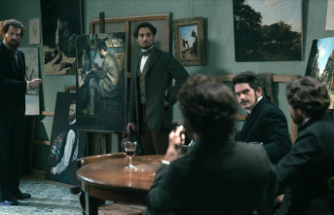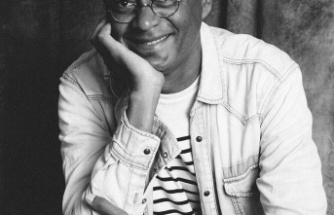Eco-anxious readers, avoid Extrapolations! Or arm yourself with a good dose of antidepressant: this new Apple TV series describes, over eight episodes covering a period of thirty-three years, the grim picture of a near future struck down by climate change. The story begins in 2037, on an Earth where warming has indeed reached a rise of 1.5°C above pre-industrial levels and is sinking all the way to 2°C. Life on the globe is deteriorating at high speed: mega-fires, air degradation, intense heat waves, complete melting of the Arctic ice cap, submersion of coastal cities, disappearance of species... In the first episode, against a background of COP42 organized in Tel-Aviv, we discover this nightmarish world and certain individual destinies which will intersect over the course of the series: a scientist and her diplomat husband (Sienna Miller and Tahar Rahim), an apprentice rabbi in Israel (Daveed Diggs) faced with the repercussions of the climate on the health of his mother, an Elon Musk-like tech titan castigated by mobs and soon to be tried in The Hague for the crime of "ecocide" (Kit Harington), a real estate developer planning the construction of floating hotels at the North Pole (Matthew Rhys)… Imagined by Scott Burns, the visionary scriptwriter of the film Contagion, Extrapolations orchestrates a gradual pre-apocalypse in the same way while providing an exit door for the planet in extremis. The series impresses with its debauchery of means (holograms, futuristic architecture, meta-universe…) and its audience of guest stars (Meryl Streep, Forest Whitaker, Marion Cotillard, Tobey Maguire…). Uneven, the series however manages to immerse us in a credible future and fulfills its mission as a whistleblower. Greta Thunberg should be seduced§ Philippe Guedj
"Extrapolations" by Scott Burns. Available on Apple TV.
Stage
In the center of Bali, the village of Sebatu is world famous for its musicians and dancers. Haven't they made ten tours in Europe and the United States since 1972? The artists of this Indonesian community which perpetuates the tradition of kecak, named after the purification ceremony which leads choirs of men to sing hypnotic melodies until inducing trance, return to France for an exceptional singing tour. After five concerts in Voiron, Paris and Bordeaux, the 40 musicians and dancers of Sebatu perform on March 23 in Dijon and on March 25 in Cannes. The opportunity to discover two aspects of Balinese culture, listed as World Heritage by Unesco: the traditional shadow theater and the subtleties of the legong kraton, a royal ballet where the history of the world is replayed every evening, "the eternal struggle of the forces of light against those of darkness, the fight of good men and women against the threat of the universe breaking up", expresses the ethnomusicologist Kati Basset who has been promoting this Asian musical gem for thirty years. § Baudouin Eschapasse
"Music, Dances and Songs of Bali", March 23 in Dijon and March 25 in Cannes.
Essay
"What do a sex toy, taser and tear gas can have in common?" You can find it in the shape of lipstick. “Makeup is everywhere, even where you least expect it. Omnipresent in the lives of women from early childhood, where make-up is available as toys, it is much more than an artifice that we choose - or not - to put on our face. Journalist in the beauty sector for more than ten years, Valentine Pétry delivers a sociological investigation on the "make-up", the underside of its market, its social, psychological and political dimension. Can you be a feminist and wear makeup? Is foundation racist? Does a man who dresses himself up automatically lose his manhood? Can this ultra-capitalist market be "green"? Erudite (we meet Rihanna and Gabrielle Chanel, but also Ovide, Louis XIV or Godard), sagacious and funny, this little book is the perfect intellectual elixir for lovers of social phenomena § Élise Lépine
"Make-Up. The makeup laid bare ", by Valentine Pétry (Les Pérégrines, 240 p., 19 €).
Roman
A neighbor found Zoran hanging in her barn. "Could you say a few words?" she wrote to Ponthus, this "friend of Paris" that the unfortunate man sometimes mentioned. To find them, these words he will pronounce in front of the coffin, Ponthus undertakes to sew up the scattered pieces of his memories. An exploration of the interstices of memory, that's the whole - captivating - story of this second novel by Philippe Ridet. Why did the one who had been his college friend fifty years earlier, in a prefecture without obvious charm, come back regularly in his thoughts and sometimes in his life? An old bond of dunces, sure, but in the end they had never had much in common - Ponthus didn't think of Zoran as a friend but rather as a 'mystery'. To untangle it, the story takes us to where the gaze and the formidable paw of this former pen of Le Monde excel: a medium-sized French town of the 1970s. , from the apartment of the deceased parents: "Thus they experienced mourning: spoon after spoon. Pure Ridet§ Fabien Roland-Lévy
"Les Amis de passage", by Philippe Ridet (Éditions des Equateurs, 192 p., €19).
THE POLAR CORNER
Impossible to decide in this collection of 28 interviews given to the press between 1973 and 1993, two years before his death. In Jean-Patrick Manchette, everything is good. Assertive radical, assertive and magnificent, we nod at this intelligence that makes you feel very small - wondering what could have happened since... Inside, aloud, the father of "neo-polar" sweeps the "bric-a-brac" of the spy novel, which "seemed to him to be an almost despicable genre", praises the noir novel, "on the contrary, excellent", tossing out jubilant nastiness, such as: "a few errors of nature like Mickey Spillane". Manchette delivers, unexpected, subscriber to the French Hunter, which he reads with "delight", as a follower of "great clarity, very dry narration". Cuff, which understands how one becomes "sadistic" or "total junk", but certainly not a cop... Cuff, which hasn't aged a bit§ Julie Malaure
"Cuff. Behind enemy lines. Interviews 1973-1993” (collected by Doug Headline, The Round Table, 304 p., €24).
IN THE POCKET
Astronomy and childhood are two odysseys across the vastness. Both operate on ignorance, come up against the enigma of time, constantly start from scratch. Richard Powers' book is like them. In 2019, the gentle giant of American letters received the Pulitzer for L'Arbre-Monde, which alerted us to the headlong rush of humanity. Stunning is a bud of this tree. It is the story of a fragile, "amazing" child, who grows up in a world "where everything is dying" and who, with his astrobiologist father, seeks his place in the Universe. Father and son have just lost their beloved wife and mother. They retreat to a forest, "at the edge of one of the last pockets of darkness in the eastern United States" to observe space. The earthly world is decaying? The other planets, maybe not. “One day we will learn to connect again to this living world,” Powers writes, “and stillness will be like flight. This book is flight and it is dizzying. Galactic, literary, but above all of love, even bigger than the sky§ Marine de Tilly
"Amazing", by Richard Powers (10/18, 408 p., €8.90).
Series. "Esterno note". The kidnapping and murder of Aldo Moro date back to 1978, but they never ceased to obsess the great Italian filmmaker Marco Bellocchio. He is now devoting a six-part series to this tragedy. Beyond the political, we touch on metaphysics, the vertigo of man in the face of death. Admirable. On Arte.tv.
Movie. "Emily". The mystery that surrounds the life of the Brontë sisters, all three passionate about writing, is a wonderful playground for actress Frances O'Connor, who is taking her first steps as a director here. She brilliantly avoids the pitfall of the traditional biopic to give free rein to her interpretation. Emma Mackey (Sex Education) is perfect as a solitary soul, rebellious and rebellious. Indoors.
Expo. "Matisse. Cahiers d'art, the turn of the 1930s". It all started with La Femme à la voilette (1927), a sumptuous canvas specially brought from MoMA in New York. We perceive the crisis of inspiration that Matisse went through as he approached his sixties, well settled in his comfort in Nice. The exhibition tells us how he finds himself: thanks to the magazine Cahiers d'art, which allows him to rediscover his own creativity; and thanks to a woman, Lydia Delector-skaya, who becomes his muse. Until May 29, at the Musée de l'Orangerie.
Apple TV/SP (x4) – Léo-Paul Ridet/Éditions des Equateurs/SP – Klaus Vedfelt/Getty Images – SP












